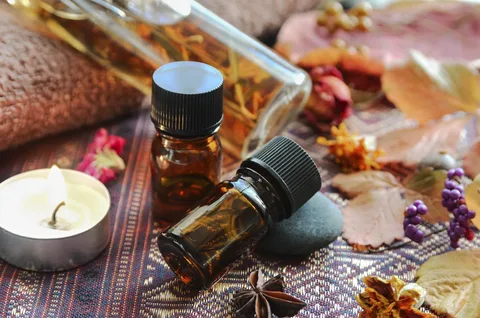Aromatherapy is the use of essential oils for physical and mental wellness. It is believed that the oils work by stimulating the olfactory receptors in our noses and brains.
During an aromatherapy session, your practitioner will take into account your medical history and symptoms. They will also apply diluted oil to your body during a massage.
What are essential oils?
Essential oils are the pure essence of a plant. They are distilled and prepared to bring the power of nature into your home. Inside many plants are powerful chemical compounds that give the plant its scent, protect it from hazardous environmental conditions, help with pollination, and are very healing. It takes hundreds or even thousands of pounds of plant material to make a pound of essential oil (EO). You want only Certified Pure Therapeutic Grade (CPTG) EO’s to be used for yourself and your family.
When a CPTG oil is inhaled the brain’s command center detects it and sends an impulse to the thalamus that separates it into three different parts – one to the motoric physical centre, another to the cortex, and the last one to the emotional plane. Each part has a unique healing response to the oil and it can have an immediate effect on your body. Aromatherapy has a holistic approach to healing and can be used in conjunction with your traditional medications.
How do I use essential oils?
Essential oils can be used aromatically, topically or internally (as a dietary supplement). They may also be added to a bath or used as a natural substitute for chemical cleaning products.
Aromatic use involves the inhalation of the oil’s scent molecules, often using an essential oil diffuser. This may be as simple as putting several drops into the palms of your hands, cupping them around your nose and mouth and inhaling. You can also mix essential oils with water in a spray bottle and spritz them on surfaces, furniture or linens.
Topical application of essential oils may be done by rubbing the oil into your skin, using a carrier oil like jojoba, olive, or coconut. Essential oils are highly concentrated and should be diluted before applying them to the skin.
Many essential oils are “generally regarded as safe” to take internally. However, you must consult a health care professional before taking essential oils as a dietary supplement.
How do I find an aromatherapist?
Aromatherapy is a holistic healing treatment that uses natural plant extracts to promote mental, physical and spiritual health. It has been around for thousands of years.
The scent of the oils is thought to stimulate areas in the brain that control emotions and memories. When the molecules are inhaled, they may also interact with blood cells to affect a person’s physiological state.
Different aromatherapy blends have been used to treat specific diseases. However, research into the efficacy of aromatherapy has been limited.
If you are considering using aromatherapy, it is important to find an experienced practitioner. You can search online or ask for a recommendation from your doctor. Make sure your aromatherapist is familiar with your medical history and any medications you are taking. They should be able to customize a blend of oils that will work well with your symptoms and lifestyle. The NAHA can help you find a practitioner in your area. They can also provide you with information on how to use essential oils at home.
What are the side effects of essential oils?
The chemicals in essential oils bind to olfactory receptors in the nose and affect areas of the brain that regulate emotions and physical health. Researchers believe that smelling lavender, for example, may stimulate parts of the brain to release stress hormones in a similar way as some sedative drugs.
Each oil has unique healing properties and effects, and many are combined to create synergistic blends. When choosing an oil, look for one that is pure and doesn’t contain added fragrance or other chemicals.
Although research supports the use of aromatherapy for some conditions, it is important to note that many studies do not provide sufficient information about the ingredients and quality of the products used in the study. If you plan to use oils, consult a trained aromatherapist or your doctor before starting a new treatment. Essential oils can also interfere with certain medications and cause rashes when applied directly to the skin. Ingestion of some oils can also harm your liver and kidneys. huiles essentielles
